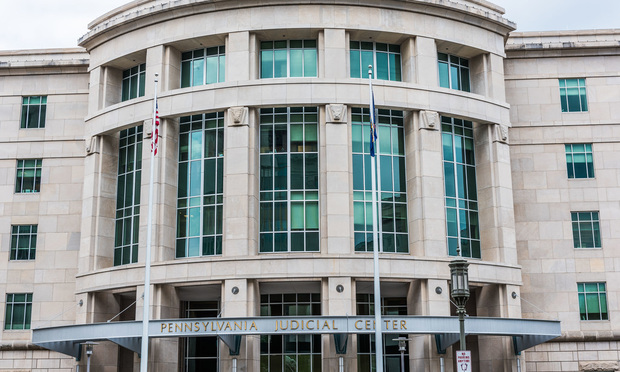Pa. Supreme Court Declares Statewide Judicial Emergency
The move also allows courts to suspend any actions allowed under the judicial administrative law, including temporarily closing court facilities.
March 16, 2020 at 02:24 PM
5 minute read
 Pennsylvania Judicial Center in Harrisburg. Photo: Andriy Blokhin/Shutterstock.com
Pennsylvania Judicial Center in Harrisburg. Photo: Andriy Blokhin/Shutterstock.com
The Pennsylvania Supreme Court has granted a statewide general judicial emergency, allowing president judges in the counties to potentially restrict and close court facilities.
The Administrative Office of Pennsylvania Courts announced the state of emergency in a press release Monday afternoon. The announcement said the state of emergency will remain in effect through April 14. Shortly after the announcement was made, the justices entered a five-page per curiam order further detailing what the declaration will mean for courts and outlining its reasoning for the move.
"The court deems it necessary for the Pennsylvania Judiciary to consider—on a district-by-district basis—the appropriate measures to be taken to safeguard the health and safety of court personnel, court users, and members of the public," the order said.
As of late Monday afternoon, at least eight court systems, including Philadelphia and Luzerne, had requested a declaration of judicial emergency.
According to the order, the move allows courts to suspend time calculations and deadlines, subject to constitutional restrictions, and authorizes the use of video- and teleconferencing to conduct court proceedings. The move also allows courts to suspend any actions allowed under the judicial administrative law, including temporarily closing court facilities.
The order, however, said that nothing should impact a defendants' speedy trial rights, which are outlined under Rule of Criminal Procedure 600.
"Nothing in this order or its local implementation shall affect a criminal defendant's right to a speedy trial under the United States and Pennsylvania Constitutions, albeit that the circumstances giving rise to this order and the suspension may be relevant to the constitutional analysis," the order said.
The declaration was granted at a time when courts across the state are closing, or limiting access to court services in an effort to combat the spread of coronavirus. On March 13, both the U.S. District Court for the Eastern District of Pennsylvania and the Montgomery County Court of Common Pleas announced they were suspending jury trials and other court services, and on Monday the Philadelphia Court of Common Pleas followed suit. The Chester County Court of Common Pleas also announced it would be postponing all trials not already scheduled, among other things.
The Pennsylvania Bar Association has also announced it has canceled or postponed several events, including the civil litigation section Philadelphia regional dinner and the women in the profession spring conference, and will teleconference its upcoming Committee/Section Day.
PBA president Anne John said the state legal system is in "uncharted territory," and the high court's order reflects an effort to keep Pennsylvanians safe, while keeping in mind their need to have access to the courts.
"Everyone's just doing what is best under the circumstances to protect lawyers, colleagues, citizens and members of the community at large," she said. "Our constitutions, the Pennsylvania and of course the United States Constitution, are the bedrock of our democracy and I'm confident that we will navigate this and that our constitutions will continue to guide us and to protect our system of justice."
On the western side of the state, Washington County Court of Common Pleas had announced it would begin turning to video- and teleconferencing services to handle a range of cases, and Allegheny County Court of Common Pleas had announced it would not be calling new jurors through at least the end of the week.
The moves, however, have not come without some criticisms.
After Montgomery County President Judge Thomas DelRicci asked the Supreme Court for a declaration of judicial emergency in the county, the justices largely granted the motion, but did not make an immediate ruling on the request to suspend Pennsylvania Rule of Criminal Procedure 600, which grants defendants the right to a speedy trial. Instead the justices held the request under advisement, and asked interested parties to object by no later than noon Monday.
Both the ACLU of Pennsylvania and the Defenders Association of Philadelphia filed objections, calling for a balanced approach and arguing that the justices needed to clarify what it was granting so the emergency status could not be applied overly broadly as courts begin to seek similar emergency declarations.
"The current order potentially supersedes both rule-based and constitutional requirements for how legal proceedings of all kinds are required to operate. This gives the judicial district the right to make alterations to those rules unilaterally; and in some instances could result in abrogating constitutional rights," the Defenders Association said in a brief filed by assistant defender Aaron Marcus, chief of the appeals unit. "While flexibility is desirable during an emergency, ambiguity in an order providing that much unilateral authority is dangerous."
The brief filed by both the ACLU and the Pennsylvania Association of Criminal Defense Lawyers echoed similar concerns about the need to uphold constitutional norms in times of crises, and further asked the court to consider conducting new bail proceedings to help alleviate jails that may be crowded with people who are incarcerated simply because they were unable to pay cash bail.
"Many of the individuals held pretrial in Montgomery County are incarcerated on cash bail. Thus, those incarcerated individuals will be exposed to an increased risk of infection simply because they cannot afford to pay for their release," the memo, filed by ACLU staff attorney Hayden Nelson-Major and PACDL president Peter Kratsa, said.
The Supreme Court's order appeared to provide guidance on some of the issues raised in the briefs, including its language saying the status should not affect a defendants' speedy trial rights. The justices had yet to make a ruling Monday afternoon about DelRicci's request.
This content has been archived. It is available through our partners, LexisNexis® and Bloomberg Law.
To view this content, please continue to their sites.
Not a Lexis Subscriber?
Subscribe Now
Not a Bloomberg Law Subscriber?
Subscribe Now
NOT FOR REPRINT
© 2025 ALM Global, LLC, All Rights Reserved. Request academic re-use from www.copyright.com. All other uses, submit a request to [email protected]. For more information visit Asset & Logo Licensing.
You Might Like
View All
Superior Court Rejects Pa. Hospital's Challenge to $7.3M Med Mal Judgment
3 minute read
Longtime Reed Smith Health Care Partner Opts for Solo Practice Over Retirement
3 minute read
Pa. Appeals Court: Trial Judge Dismissed Med Mal Claims Without Giving Plaintiffs Proper Time to Fight Back
4 minute read
Pa. Hospital Agrees to $16M Settlement Following High Schooler's Improper Discharge
4 minute readTrending Stories
Who Got The Work
J. Brugh Lower of Gibbons has entered an appearance for industrial equipment supplier Devco Corporation in a pending trademark infringement lawsuit. The suit, accusing the defendant of selling knock-off Graco products, was filed Dec. 18 in New Jersey District Court by Rivkin Radler on behalf of Graco Inc. and Graco Minnesota. The case, assigned to U.S. District Judge Zahid N. Quraishi, is 3:24-cv-11294, Graco Inc. et al v. Devco Corporation.
Who Got The Work
Rebecca Maller-Stein and Kent A. Yalowitz of Arnold & Porter Kaye Scholer have entered their appearances for Hanaco Venture Capital and its executives, Lior Prosor and David Frankel, in a pending securities lawsuit. The action, filed on Dec. 24 in New York Southern District Court by Zell, Aron & Co. on behalf of Goldeneye Advisors, accuses the defendants of negligently and fraudulently managing the plaintiff's $1 million investment. The case, assigned to U.S. District Judge Vernon S. Broderick, is 1:24-cv-09918, Goldeneye Advisors, LLC v. Hanaco Venture Capital, Ltd. et al.
Who Got The Work
Attorneys from A&O Shearman has stepped in as defense counsel for Toronto-Dominion Bank and other defendants in a pending securities class action. The suit, filed Dec. 11 in New York Southern District Court by Bleichmar Fonti & Auld, accuses the defendants of concealing the bank's 'pervasive' deficiencies in regards to its compliance with the Bank Secrecy Act and the quality of its anti-money laundering controls. The case, assigned to U.S. District Judge Arun Subramanian, is 1:24-cv-09445, Gonzalez v. The Toronto-Dominion Bank et al.
Who Got The Work
Crown Castle International, a Pennsylvania company providing shared communications infrastructure, has turned to Luke D. Wolf of Gordon Rees Scully Mansukhani to fend off a pending breach-of-contract lawsuit. The court action, filed Nov. 25 in Michigan Eastern District Court by Hooper Hathaway PC on behalf of The Town Residences LLC, accuses Crown Castle of failing to transfer approximately $30,000 in utility payments from T-Mobile in breach of a roof-top lease and assignment agreement. The case, assigned to U.S. District Judge Susan K. Declercq, is 2:24-cv-13131, The Town Residences LLC v. T-Mobile US, Inc. et al.
Who Got The Work
Wilfred P. Coronato and Daniel M. Schwartz of McCarter & English have stepped in as defense counsel to Electrolux Home Products Inc. in a pending product liability lawsuit. The court action, filed Nov. 26 in New York Eastern District Court by Poulos Lopiccolo PC and Nagel Rice LLP on behalf of David Stern, alleges that the defendant's refrigerators’ drawers and shelving repeatedly break and fall apart within months after purchase. The case, assigned to U.S. District Judge Joan M. Azrack, is 2:24-cv-08204, Stern v. Electrolux Home Products, Inc.
Featured Firms
Law Offices of Gary Martin Hays & Associates, P.C.
(470) 294-1674
Law Offices of Mark E. Salomone
(857) 444-6468
Smith & Hassler
(713) 739-1250





